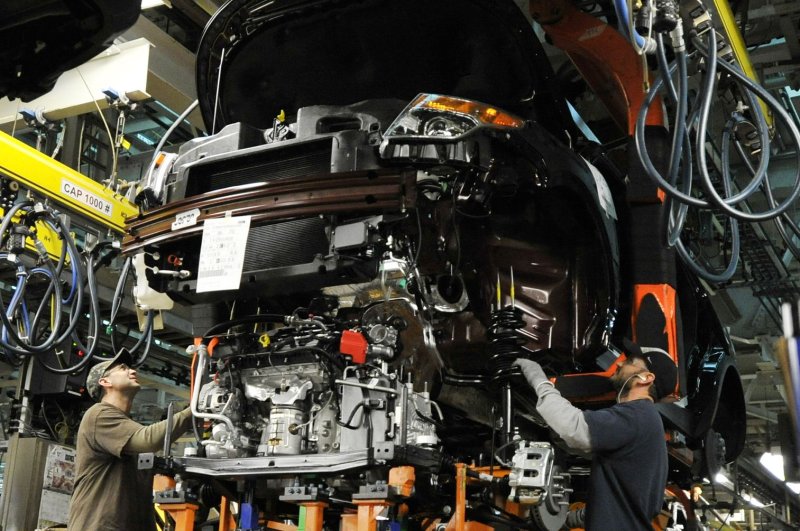A decision to review fuel standards set for 2025 cheered by the automotive industry, though some automakers already moving to green up their fleet on their own. File Photo by Brian Kersey/UPI |
License Photo
April 3 (UPI) -- While a trade group representing the U.S. auto industry said a review of fuel standards was the right move, critics said it would hurt the average consumer.
Environmental Protection Agency Administrator Scott Pruitt said Monday the government was working to set "more appropriate" greenhouse gas emission and fuel economy standards for the automotive industry, saying former President Barack Obama cut the review process short.
"Obama's EPA cut the midterm evaluation process short with politically charged expediency, made assumptions about the standards that didn't comport with reality, and set the standards too high," he said in a statement.
As part of his policy of undoing many of his predecessor's environmental moves, President Donald Trump last year called for a review of rules submitted by Obama mandating an increase in fuel economy for all domestic vehicles to an average of 54.5 miles per gallon by 2025. After Obama's orders were issued, the National Highway Traffic and Safety Administration said that, when fuel standards are raised, automakers move to create a more fuel-efficient line, save consumers money and cut back on emissions.
The transportation sector is the largest emitter of greenhouse gases. The average fuel economy during Obama's tenure was around 25 mpg. The average retail price of gas, meanwhile, is up about 15 percent from last year.
The Auto Alliance, an industry trade group, said the EPA's decision under Trump was the right move to make. As it stands, automakers are committed to improving fuel efficiency and transitioning to electric cars, which have a sticker price that could be off limits to some consumers.
"So, to ensure ongoing fuel economy improvement, the wisest course of action is to keep new vehicles affordable so more consumers can replace an older car with a new vehicle that uses much less fuel," the group stated.
Mary Barra, the head of General Motors, said last month her company is committed to zero emissions and an all-electric line.
"We have the ambition, the talent and the technology to create a world with zero crashes, zero emissions and zero congestion," she said in a statement.
Swedish automaker Volvo said last year it was marking an end to a vehicle line powered solely by the internal combustion engine. On the low-end, the International Energy Agency estimates the number of electric vehicles on the road will at least quadruple globally by 2020, but incentives are needed to drive sales because larger trucks and SUVs lead by volume.
U.S. Rep. Paul Tonko, D-N.Y., said Pruitt's call for a review of fuel and emissions standards could take the $1,650 in savings over the life of a vehicle out of the pockets of American taxpayers. Instead of a clear path forward, the Trump administration was creating artificial headwinds without much in the way of an explanation.
"A few industry lobbyists may be celebrating in Administrator Pruitt's apartment, but with middle class wages flatlining and 17 of the last 18 years being the warmest on record, consumers and America's future generations will pay a steep price for this decision," he said.
Pruitt faced ethics questions over the rental of a condo owned by a lobbyist for the energy industry.















